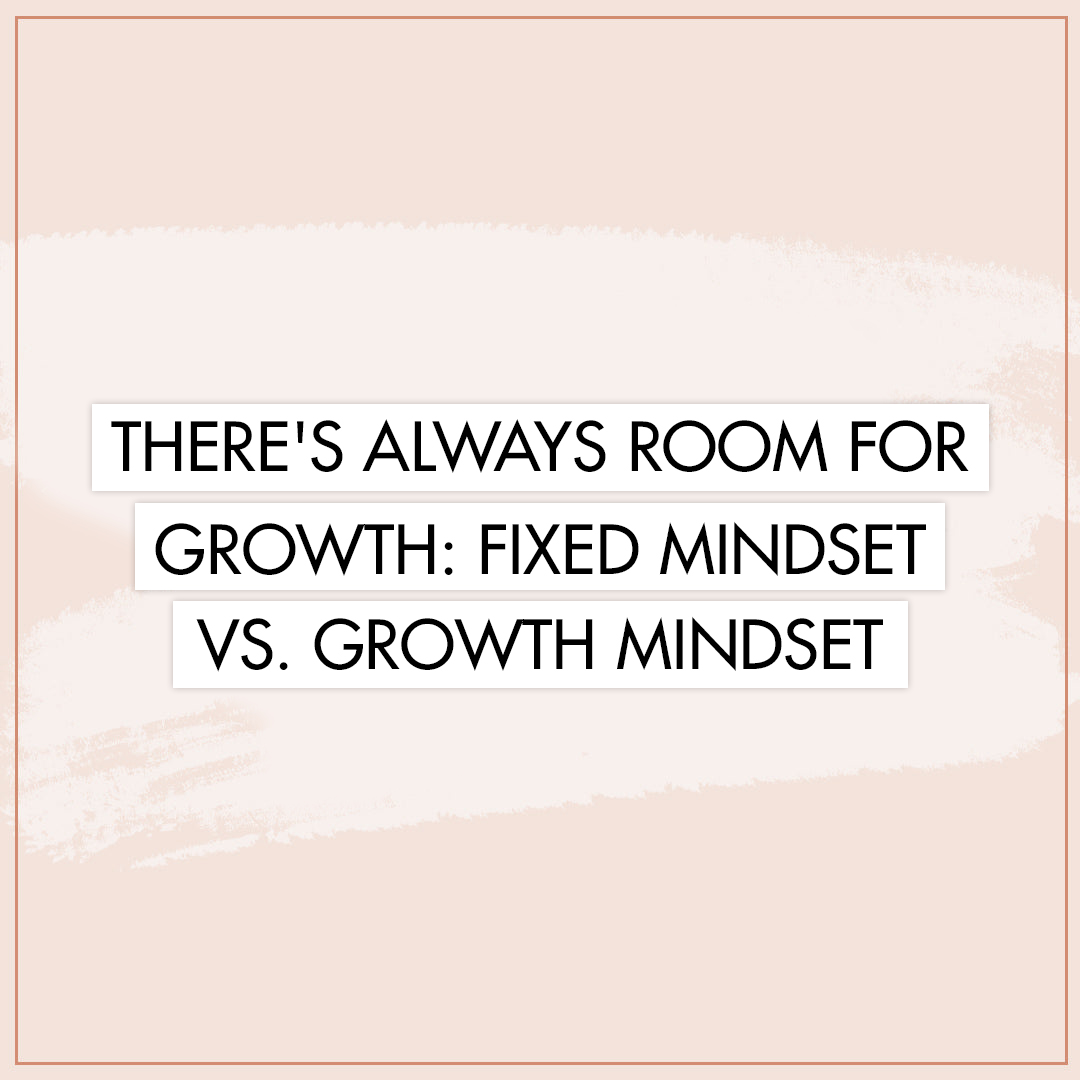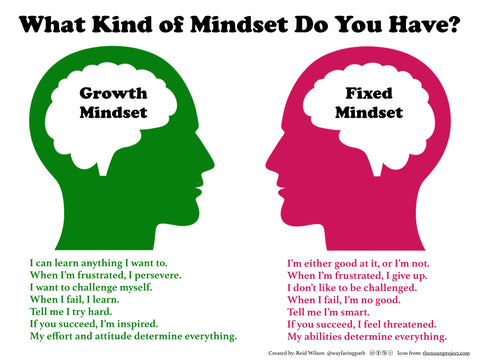There’s Always Room for Growth: Fixed Mindset vs. Growth Mindset

Meet Sophie. Sophie is a 26 year-old female living it up in the city. She works hard and parties even harder. The problem is, her heavy drinking tendencies, combined with her voracious appetite for late-night nachos and donuts, have been catching up to her. While she graduated college at a slim 5’2″ 110lbs, it’s now four years later and she’s sporting a comfortable 25+ extra pounds on her petite frame.
It’s time to get serious. This simply cannot do.
In the blink of an eye, Sophie tosses out all the junk food from her home. She’s a clean eater now! Is dairy considered clean? Hmm… she’s not sure, but she figures that she should probably get rid of it – you know, just in case. She starts up a gym membership at the local Y and resolves to hit the elliptical seven days a week. Despite warnings from her well-meaning friends that perhaps she shouldn’t take things to the extreme quite so quickly, and despite gentle suggestions from fitness coaches that clean eating isn’t actually a real thing, she’s too impatient to listen. Sophie doesn’t care. Sophie is hardcore.
It took four years for the extra weight to creep on, so naturally, it makes logical sense that she should expect to shed it all off in a span of four weeks. Obviously.
Sophie sweats her buns off with hours upon mind-numbing hours of cardio. She chomps down on gala apples with resolve and shovels down raw almonds by the handful. Her daily veggies are doused in coconut oil, and she’s dunking gobs of butter into her morning coffee. Though she hates kale with a passion, she forces herself to choke down green smoothies. She’s on a mission here.
Fourteen days later, Sophie excitedly steps on the scale to check on her progress. She’s confident that she’ll have lost at least ten pounds by now – after all, she’s been suffering so much. But to her dismay, she finds that actually, the scale is reading three pounds heavier. Heavier! How could this be?
First dismay, then fury. “Forget it. I’m obviously not cut out for this!” she shrieks. “I’m doomed to be chunky for the rest of my life. It’s my genetics.”
And with that, she quits. She dives headfirst into a box of donuts and quickly reverts back to her gluttonous ways. Her gym membership eventually expires, and so ends her short-lived quest back to leanness.

Do you agree or disagree with the following statements?
“You have a fixed level of ability that cannot be changed.”
“While you can learn new things, you cannot improve your basic level of ability.”
If you agree with the above, you may be fostering what’s called fixed mindset.
Fixed Mindset
Individuals with fixed mindset believe that there’s no changing baseline skills and talents. Whatever level of ability you’re born with is what you’re stuck with for the rest of your life.
Don’t work too hard. Make sure you look the part. If you have to exert effort, that must means that you’re not talented to begin with and that’s a sign of weakness. Avoid challenges as much as possible. If you face a failure, run and hide – make excuses, place blame on others, become the victim.
These are the thought processes of a fixed mindset.
As long as you’re not challenged, you can accomplish what you want with ease. No one has any constructive feedback for you, and you’re constantly put up on a pedestal – this is when you’re happiest. Inherent talent is everything. It’s when someone dares to point out a flaw that all hell breaks loose.
Think about someone you might know – a colleague, a friend, a family member – who always seems to poo-poo on your parade. She insists on going out of her way to complain about this and that disposition, but when you offer advice or suggest methods for improvement, she’s quick to point out why that’s not possible. This is the kind of individual who might throw a tantrum when receiving a less than desirable grade on an algebra test and declare that she’s simply not cut out for math. When receiving constructive feedback, she’ll view it as an attack on her character and become irrationally defensive rather than seeing it as an opportunity for growth. She’s allergic to hard work.
In the fixed mindset, failure takes on a whole new meaning. Instead of failure being something you do, it becomes who you are. It’s not that you failed at a particular task; it’s that you are a failure. The internalization of failure can be crippling and have lifelong impacts.
Here are some more examples of fixed mindset rearing its ugly head:
When your friend gets a promotion at work, instead of being happy for her, you’re enraged. You feel that her success takes away from your own accomplishments and makes you less than.
When you get your first B- on a paper and you glance at all the red scribbles your professor has made across the pages, you take this as proof that you were never meant to be a writer anyway and you withdraw from the class.
When you perform poorly on a midterm, you spend even less time studying for the next one and even resort to cheating just so you can get a better grade.
When you lose in a game of chess, you come up with a hundred and one excuses as to why you didn’t win: you didn’t sleep enough the night before; you had a headache that prevented you from fully concentrating; you were nauseous from having just eaten; there was a noise in the room that was distracting you.
In the story above, Sophie is harboring a fixed mindset toward her fat loss journey. At the first sign of a setback, she throws in the towel. It never occurs to her that perhaps some troubleshooting of her fitness regimen would reveal some massive areas for improvement.
Growth Mindset
Those with growth mindset exhibit markedly differently thought processes and behaviors as compared to that of individuals with fixed mindset. They believe that basic abilities can be fostered and developed through perseverance and dedication. Inherent talent is simply the baseline, and full potential can only be realized through continued learning and practice.
Learn as much as you can. Dedicated practice is key. Actively work to improve upon your deficiencies and mistakes. A failure isn’t a dead-end; it’s a learning opportunity for improvement.
Do you see the stark contrast between the two mindsets?
Growth mindset individuals understand that it’s a combination of smarts plus effort that leads to success. In other words, it’s not that either you’re smart oryou have to work hard; you can absolutely have both qualities – and in fact, this is highly valued.
Here are some growth mindset scenarios:
- You try out for your high school volleyball team but you don’t make the varsity squad like you’d hoped. Rather than throwing a tantrum, you talk to the coach about what skills you need to work on, and you spend an extra hour every evening honing your craft for the next several months so you might make the team next year.
- You’ve always enjoyed math, and you’ve gotten good grades in algebra and geometry with relative ease. But now that you’ve hit pre-calculus, concepts are a little more abstract and a little more confusing than before. You recruit the help of a math tutor to help you understand the lessons so you can continue to learn.
- For several years straight, you’ve always been the highest performing salesperson in your company. One day, a new hire comes in and threatens to snag the top spot away from you. This inspires you more than ever to polish your craft. In fact, you’re almost grateful that he’s entered the picture because now he’s forcing you to stay on top of your game rather than get complacent.
- At your first bodybuilding show, you don’t place as well as you’d hoped during prejudging. You still stay around through finals, however, all with a smile on your face and a pep in your step. When the show is over, you talk to the judges to receive their feedback, and then you decide to dedicate the next three years to building up your lagging body parts before you begin another contest prep again.
A growth mindset isn’t afraid to try. In fact, if you harbor growth mindset, you enthusiastically welcome a challenge and you’re motivated by setbacks.
If Sophie had had a growth mindset, she would have analyzed her fitness program objectively (or perhaps hired a knowledgeable coach) and realized that, while her food choices were high quality, she was simply consuming too many overall calories to create any kind of energy deficit. As well, reducing the endless hours of cardio and instead prioritizing strength training would yield the positive body composition changes she was going for. She could have corrected her erroneous ways and been well on her way to success if only she had believed that there was still room for growth.
The best success stories we come across are those of triumph, relentless effort, and indomitable will. Michael Jordan, Tiger Woods, Dara Torres – these are all high-level athletes who beat the odds and went out of their way to become the world’s best at what they do. They woke up earlier, stayed at practice longer, and did what others were not willing to do.
When faced with a challenge, do you shy away, or do you rise to the occasion?

How Do We Influence Mindset?
We all start at different baseline temperaments and aptitudes, but it’s through the course of experience, practice, and “purposeful engagement,” as Robert Sternberg, authority figure on intelligence, calls it, that we maximize our potentials. In other words, it’s a combination of genetics and environment. Alfred Binet, the inventor of the IQ system, additionally reflected that just because you start out the smartest doesn’t mean you end up the smartest.
A 1998 study by Mueller and Dweck found that praising children for their intelligence led to the opposite desired effect: decreased task persistence, reduced task enjoyment, and a decline in task performance following a failure. By praising their ability and not their effort, they were taught that competency is a fixed trait and consequently became focused more on seeming smart and less on actual learning. This also led to learned helplessness, in which individuals gave up in the face of failure rather than persisting (Dweck & Leggett, 1988). On the other hand, those praised for their efforts demonstrated an increased interest in mastery of the given subject and were more curious about learning.
This flies in the face of what we think we know about factors that influence performance. By praising intelligence, we may be sending the message that good performance is a direct result of high intelligence. It would make sense, then, to reason that when performance drops, it is the result of insufficient intelligence rather than effort. But this is incorrect and misguided.
Think about a schoolmate you knew during your middle school or perhaps even high school years who seemed to excel in all her classes without even having to try. She would kick back during class and still come out with a solid A because the course material simply came easily to her. Everyone likely praised her for how smart she was and envied her natural intelligence. While she may have snagged the “Most Likely to Succeed” superlative in the yearbook, it’s now 10 years later, and she seems to have puttered out. She’s dropped out of college where courses were more difficult because she quit rather than try and learn. She can’t hold down a steady job to save her life. This is the victim of fixed mindset.

Being aware of the two different mindsets can be enough to recognize when your thoughts are heading in a particular direction. And yes, you can have different mindsets in different areas. For example, I’ve always been curious about different academic subjects and consequently have always gone out of my way to learn more about a given topic and do well in a course – growth mindset right here. When it comes to sports, however, I’ve admittedly held a fixed mindset about my athletic abilities and I’ve never tried to improve my ball dribbling skills (or rather, lack thereof).
(I will add here as well that sometimes it’s perfectly harmless to harbor a fixed mindset about a given area if it does not negatively impact your life. I have no qualms whatsoever about my lack of athletic ability and I’m doing more than fine not actively trying to become better at basketball.)
The good news is that it’s entirely possible to change your mindset. Our attitudes are shaped not only by how we speak to ourselves, but also by how others, particularly mentors and advisers (parents, teachers, coaches, and so on) treat us. If a cross country coach decides only to devote his attention and energies into his best runners at the beginning of the season and ignore everyone else, he’s effectively sending the message to the rest of the pack that they don’t have what it takes to succeed – he’s teaching fixed mindset. But if, instead, he encourages even his slower runners and praises their diligent efforts, they’ll continue showing up, they’ll try harder, and they’ll be less likely to quit.
Ironically, it’s oftentimes those with growth mindset – those who are not fixated on being the best, but instead on making the most out of the journey itself – that make it to the top, while those with fixed mindset flounder.
What world do you live in? You may find comfort in a fixed mindset world, because then, ostensibly nothing is your fault and there’s nothing you can do to change your circumstances. But you’ll be shortchanging your opportunities and you won’t get very far in life.
I challenge you to take an honest, hard look at some aspect of your life where you feel like you’ve hit a dead end. Are you an aspiring entrepreneur who’s struggling to find her stride? Maybe you’re averse to feedback and you’re not challenging yourself enough. Are you like Sophie and can’t stay consistent on a fat loss program to save your life? Perhaps you’re being too strict and stubborn with your regimen and unlucky genetics actually has very little to do with your disposition.
There’s always room for growth – you just have to recognize it and believe it to be true. The mind is an incredibly, incredibly powerful thing. You will fulfill your true potential if you believe that you have the capability to do so. Find joy and meaning in the process and the results will take care of themselves.
You always have a choice.
References
Dweck, Carol S. “The role of expectations and attributions in the alleviation of learned helplessness.” Journal of personality and social psychology 31.4 (1975): 674.
Dweck, Carol S., and Ellen L. Leggett. “A social-cognitive approach to motivation and personality.” Psychological review 95.2 (1988): 256.
Elliott, Elaine S., and Carol S. Dweck. “Goals: an approach to motivation and achievement.” Journal of personality and social psychology 54.1 (1988): 5.
Mueller, Claudia M., and Carol S. Dweck. “Praise for intelligence can undermine children’s motivation and performance.” Journal of personality and social psychology 75.1 (1998): 33.





